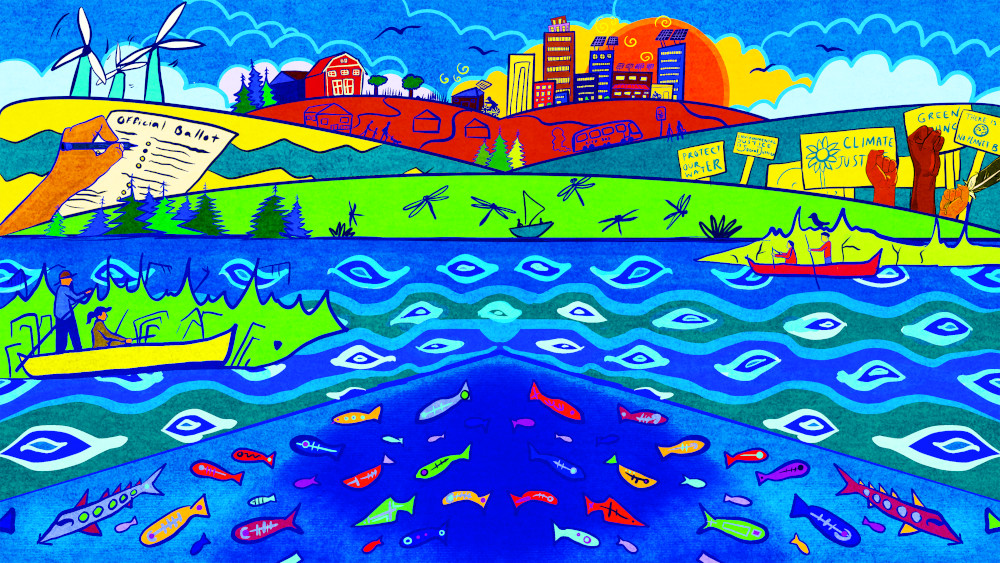
Original art by Moira Villiard
Dominique Diaddigo-Cash
Saint Paul Mayor Melvin Carter III introduced a measure to establish a Climate Justice Advisory Board in 2020 to work toward carbon neutrality for the city and its residents.
This board was created to advise in the design of policies that intersect with the Saint Paul Climate Action and Resilience Plan (CARP). The goal of CARP is to achieve carbon neutrality for city operations by 2030 and citywide by 2050.
The inaugural members of the board include representatives from environmental organizations, private corporations, and community organizers to represent a broad spectrum of perspectives. I was selected to join the board for a three year term, joining 16 others from across the east metro.
We spent much of our first year becoming grounded in the content of CARP. CARP talks about the vulnerabilities of Saint Paul to the impacts of ongoing climate change and takes initial steps to identify any disparities in vulnerability. For instance, those under the age of five or over the age of 65 face increased vulnerability to incidents such as extreme weather, illness, or air pollution. Similarly, in households where the dominant language is not English, there is additional care needed to ensure outreach, education, and safety materials are accessible to all residents.
During this time, two opportunities to engage in dialogue with the City Council around broader justice issues emerged.
The first was following the Minneapolis police murder of Daunte Wright, after which Minneapolis and Saint Paul issued respective curfews. These curfews, intended to discourage protest, had a negative impact on frontline workers and people who relied on transit. The Saint Paul Criminal Justice Advisory Board (CJAB) joined in with other organizations such as the NAACP, Black Lives Matter, and the Saint Paul Federation of Educators in calling on Mayor Carter to lift the curfew to provide relief.
The second opportunity was a statement about Enbridge Line 3 and the water crossing permits issued in 2020. The CJAB acknowledged that our work needs to transcend geographical boundaries to fully understand climatic impacts. Following the lead of Saint Paul 350, the CJAB submitted a memo of support to calls to revoke the permits. This resulted in a meeting between the board and the Ramsey County attorney who expressed sympathy with our activism and reaffirmed our important role as it relates to policies within CARP.
These activities were beyond the traditional scope of our responsibilities as an advisory, but nonetheless they have created meaningful opportunities to build relationships and grow into our purpose. This helps to expand the overall mission of climate justice and to understand the ways that we are all linked together.
The board meetings have also been a place to learn about community initiatives that we could help shape and participate in. These have included Xcel Energy discussing their 15-year Integrated Resource Plan, the Electric Vehicle Spot Network, and the Saint Paul Youth Commission. Every opportunity has been generative, whether in the form of providing direct feedback for the implementation of an initiative or through the simple act of building community across sectors and between neighborhoods.
For Saint Paul and Ramsey County to achieve their climate goals, changes in our infrastructure will need to be developed with an imperative for resilience, and agencies will need to ensure that this takes priority over profitable development agreements. It’s the role of public advisories to ensure that this planning doesn’t happen at the expense of working class communities or communities of color. The CJAB’s focus on climate justice as opposed to simply climate change adaptation is a step toward ensuring that happens.
Going beyond CARP, the board will need to engage directly with residents of Saint Paul to deepen our understanding of their experiences and to learn about new and emergent issues. The board reports directly to the city council and mayor’s office.
Moving forward, the board has identified a list of priorities where our advisory is most urgent. These priorities are:
-
Transportation
-
Energy burden
-
Green workforce development and inclusion
-
Emergency preparedness
-
Communication/education within the community.
In April 2022, members of the board presented a summary of our first year to the Saint Paul City Council–the first face to face meeting for many of us.
Building resilience to climate change and working to hold back the tide of environmental ruin and corporate greed will happen through instituting sensible policies and lasting regulations.
This means understanding that the impacts of climate change more severely impact communities of color, people living in poverty, developing nations, and people living in poverty.
Through building relationships with those who are most impacted, institutions and agencies can help to amplify the voices of those whose lived experiences convey the urgency of the work.
The story of the work of the Climate Justice Advisory Board highlights much of what it means to be a community organizer focused on climate justice. You can follow this work by visiting the Board’s page on the St. Paul City website.
Dominique Diaddigo-Cash is an Organizing Representative with the Sierra Club and a lifelong community organizer and restorative practices circle-keeper — welcoming marginalized identities and experiences into various movements for social change.